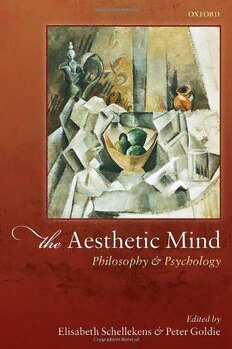
The Aesthetic Mind: Philosophy and Psychology PDF
Preview The Aesthetic Mind: Philosophy and Psychology
The Aesthetic Mind This page intentionally left blank The Aesthetic Mind Philosophy and Psychology EDITED BY Elisabeth Schellekens and Peter Goldie 1 3 GreatClarendonStreet,OxfordOX26DP OxfordUniversityPressisadepartmentoftheUniversityofOxford. ItfurtherstheUniversity’sobjectiveofexcellenceinresearch,scholarship, andeducationbypublishingworldwidein Oxford NewYork Auckland CapeTown DaresSalaam HongKong Karachi KualaLumpur Madrid Melbourne MexicoCity Nairobi NewDelhi Shanghai Taipei Toronto Withofficesin Argentina Austria Brazil Chile CzechRepublic France Greece Guatemala Hungary Italy Japan Poland Portugal Singapore SouthKorea Switzerland Thailand Turkey Ukraine Vietnam OxfordisaregisteredtrademarkofOxfordUniversityPress intheUKandincertainothercountries PublishedintheUnitedStates byOxfordUniversityPressInc.,NewYork #theseveralcontributors2011 Themoralrightsoftheauthorshavebeenasserted DatabaserightOxfordUniversityPress(maker) Firstpublished2011 Allrightsreserved.Nopartofthispublicationmaybereproduced, storedinaretrievalsystem,ortransmitted,inanyformorbyanymeans, withoutthepriorpermissioninwritingofOxfordUniversityPress, orasexpresslypermittedbylaw,orundertermsagreedwiththeappropriate reprographicsrightsorganization.Enquiriesconcerningreproduction outsidethescopeoftheaboveshouldbesenttotheRightsDepartment, OxfordUniversityPress,attheaddressabove Youmustnotcirculatethisbookinanyotherbindingorcover andyoumustimposethesameconditiononanyacquirer BritishLibraryCataloguinginPublicationData Dataavailable LibraryofCongressCataloginginPublicationData Dataavailable TypesetbySPIPublisherServices,Pondicherry,India PrintedinGreatBritain onacid-freepaperby MPGBooksGroup,BodminandKing’sLynn ISBN 978–0–19–969151–7 1 3 5 7 9 10 8 6 4 2 Contents ListofFigures viii NotesonContributors ix Introduction 1 ElisabethSchellekensandPeterGoldie Part I. The Psychology of the Aesthetic 1. TheMasteroftheMasekBeds:Handaxes,Art,andtheMindsof EarlyHumans 9 GregoryCurrie 2. TheFragilityofAestheticKnowledge:AestheticPsychologyand AppreciativeVirtues 32 MatthewKieran 3. Neuroscience,Biology,andBrainEvolutioninVisualArt 44 DahliaW.Zaidel 4. FactandFictionintheNeuropsychologyofArt 54 RomanFriggandCatherineHoward Part II. Emotion in Aesthetic Experience 5. EmotionandAestheticValue 71 JessePrinz 6. BeautyisFelt,NotCalculated;anditDoesNotFitinBoxes 89 RoddyCowie 7. TheEthicsofAestheticBootstrapping 106 PeterGoldie 8. TheOriginsofAesthetics:ANeurobiologicalBasisforAffective FeelingsandAesthetics 116 EdmundT.Rolls Part III. Beauty and Universality 9. BeautyisInstinctiveFeeling:ExperimentingonAestheticsandArt 169 I.C.McManus vi CONTENTS 10. BeautyisNotOne:TheIrreducibleVarietyofVisualBeauty 190 JerroldLevinson 11. Aesthetics:TheApproachfromSocialAnthropology 208 RobertLayton 12. ExperiencingtheAesthetic:KantianAutonomyorEvolutionaryBiology? 223 ElisabethSchellekens Part IV. Imagination and Make-Believe 13. ImaginationUnblocked 239 AaronMeskinandJonathanM.Weinberg 14. AnAttitudeTowardsthePossible:TheContributionsofPretend PlaytoLaterAdultConsciousness 254 DorothyG.SingerandJeromeL.Singer 15. UnpackingtheBoxes:TheCognitiveTheoryofImagination andAesthetics 268 KathleenStock Part V. Fiction and Empathy 16. EnactingtheOther:TowardsanAestheticsofFeelingin LiteraryReading 285 DavidS.Miall 17. OnKeepingPsychologyOutofLiteraryCriticism 299 PeterLamarque 18. MirroringFictionalOthers 313 ZannaClayandMarcoIacoboni Part VI. Music, Dance, and Expressivity 19. MovinginConcert:DanceandMusic 333 Noe¨lCarrollandMargaretMoore 20. ‘I’llBeYourMirror’?EmbodiedAgency,Dance,andNeuroscience 346 DavidDavies 21. MusicandEmotion:PsychologicalConsiderations 357 WilliamFordeThompsonandLenaQuinto 22. Cross-CulturalMusicalExpressiveness:TheoryandtheEmpirical Programme 376 StephenDavies CONTENTS vii Part VII. Pictorial Representation and Appreciation 23. NeurologyandtheNewRiddleofPictorialStyle 391 MarkRollins 24. VarietiesofPictorialJudgement:AFunctionalAccount 414 NormanH.Freeman 25. PictorialRepresentationandPsychology 427 DerekMatravers Index 439 List of Figures 1.1 Handaxebandedironstone,c.750,000BP,McGregorMuseum, Kimberley 12 1.2 Hoxnehandaxe,LowerPalaeolithic,c.400,000BP,Hoxne,Suffolk, England 12 1.3 HandaxesfromtheMasekBeds,Olduvai.FromM.Leakey(ed.), OlduvaiGorge,volume5,CambridgeUniversityPress,1994 13 1.4 Ficron,Cuxton,England 14 1.5 Handaxe,SimadelosHuesos,Spain400,000BP 15 8.1 Someoftheemotionsassociatedwithdifferentreinforcement contingencies 117 8.2 Dualroutestotheinitiationofactioninresponsetorewarding andpunishingstimuli 123 8.3 TwoForms(January)1967.BarbaraHepworth 145 9.1 Examplesofninedisparatesetsofrectanglepreferences (fromMcManus,Cook,andHunt,inpress) 178 9.2 Thetwomainunderlyingfactorsfortherectanglepreferences, reconstructedfromtheQ-modefactoranalysis 179 9.3 Twocomputer-generatedMondrian-likeimages 181 9.4 Exampleofanimageusedinthecroppingexperiment 184 21.1 Anillustrationofthesynchronizationfeedbackmodel 371 24.1 Fourentitlescontractsixbidirectionalrelations 418 Notes on Contributors NOE¨L CARROLL is Distinguished Professor of Philosophy at the Graduate Center of the City UniversityofNewYork.HismostrecentbookisOnCriticism(Routledge,2008). ZANNA CLAY is a primatologist at the School of Psychology in St Andrews. She studies the cognitivemechanismsunderlyingcommunicationinaspeciesofgreatape,thebonobo.Being the closest living relatives to humans, the investigation of bonobo behaviour can provide important insights into the evolution of human behaviour, including empathy. Much of her fieldworkisconductedinDRCongo,wherebonobosareendemic. RODDYCOWIEstudiedphilosophyandpsychologyasanundergraduate(atStirlingandUCLA), andhisPh.D.(atSussex)wasontherelationshipbetweenhumanandmachinevision.Hewas appointedLecturerinPsychologyatQueen’sUniversityBelfastin1975,andProfessorin2003. Hiscoreresearchinterestisinrelationshipsbetweenrationalmodelsofperceptionandexperi- ences that are intensely subjective and seemingly counter to rational expectation. It has been followedthroughmanyareas—‘impossibleobjects’,misperceptionsofmovement,thesubjective experienceofhearingloss,andtheperceptionandexpressionofemotion.Hisworkonemotion included co-ordinating the EC’s HUMAINE project, which aimed to lay the foundations foremotion-orientedtechnology.Healsohaslong-standinginterestsinmusicandreligion,as academicandpractitioner. GREGORY CURRIE teaches philosophy at the University of Nottingham. His latest book is Narratives and Narrators (OUP, 2010). He is currently working on the cognitive value of literature. DAVID DAVIES is Professor of Philosophy at McGill University. He is the author of Art as Performance(Blackwell,2004),AestheticsandLiterature(Continuum,2007),andPhilosophyofthe Performing Arts (Blackwell, forthcoming), and the editor of The Thin Red Line (2008) in the Routledge series Philosophers on Film. He has published widely in the philosophy of art on topicsrelatingtoontology,artisticvalue,literature,film,music,theatre,andthevisualarts.He hasalsopublishedarticlesontopicsinmetaphysics,philosophyoflanguage,philosophyofmind, andphilosophyofscience. STEPHENDAVIESisProfessorofPhilosophyattheUniversityofAucklandinNewZealandandan ex-PresidentoftheAmericanSocietyofAesthetics.Hismainresearchinterestsareinaesthetics andthephilosophyofart.HisbooksincludeMusicalWorksandPerformances(ClarendonPress, 2001), Themes in the Philosophy of Music (OUP, 2003), Philosophical Perspectives on Art (OUP, 2007), and The Philosophy of Art (Blackwell, 2006). He is co-editor of Companion to Aesthetics (Wiley-Blackwell,2009,2ndedn.). NORMAN H. FREEMAN is Emeritus Professor of Cognitive Development and Senior Research Fellow in the School of Experimental Psychology, University of Bristol. His main areas of research include drawing-production and children’s theory of pictures. He has published two
